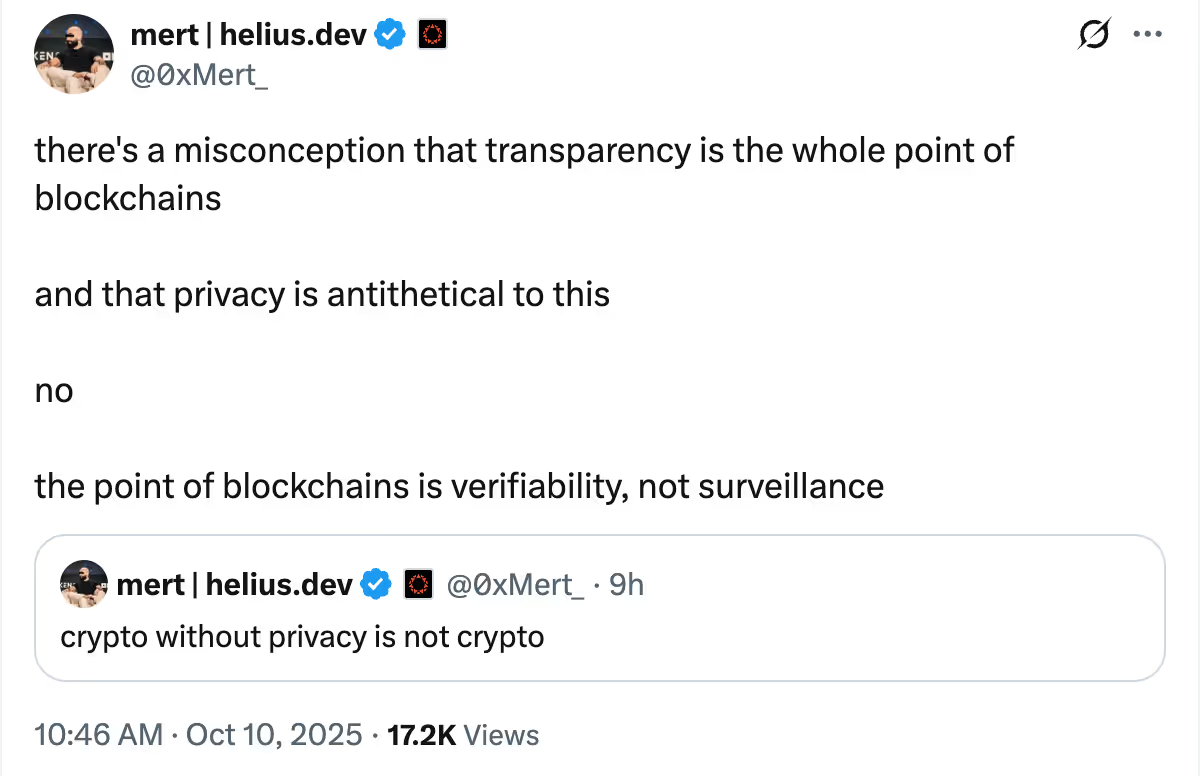
In 2023, Forrester Consulting released a survey showing that security and privacy were the top concerns for enterprise companies considering using the blockchain for their business. This matters because, while web3 offers tremendous opportunities, without the right infrastructure in place these concerns remain justified.
Many chains, for example, appear anonymous but are only pseudonymous. This means that wallet addresses don’t directly reveal identities, but every transaction is still public and traceable. With enough data, analysts can trace patterns, cluster wallets, and link them to real organizations, a definite privacy risk.
And on the security side, many wallet providers don’t have a way to verify that their security is doing what it should in protecting business assets. Enterprises are left trusting black-box systems they can’t inspect or verify.
The good news: a new generation of web3 infrastructure is emerging to solve both problems, embedding verifiable security and true business privacy directly into transactional workflows.
This article explores how privacy and verifiable security can work together to make public blockchains viable for enterprise use. It highlights emerging technologies that protect data and prove integrity, and shows how Turnkey’s enclave architecture, remote attestation, and policy controls let organizations verify that every wallet operation runs securely, privately, and exactly as intended.
The tension between privacy and transparency

Public blockchains are built on transparency, a feature that underpins their integrity and trust. Every transaction is visible, verifiable, and permanent. For open networks, that’s a strength. For enterprises, it could be a liability.
Transparency ensures that no hidden edits, reversals, or fraud can occur. But it also means anyone can analyze what’s happening, drawing inferences from timing, volume, and wallet behavior. What gives blockchains their credibility also exposes organizations to competitive, regulatory, and reputational risk.
Last year, Arkham Intelligence claimed to have identified 96 public Bitcoin addresses belonging to Tesla and SpaceX. While neither company confirmed the claim, onchain forensics made the connection plausible by analyzing deposit patterns, transaction timing, and exchange clusters linked to their previously disclosed holdings.
Even without explicit confirmation, this kind of visibility exposes a surprising amount of sensitive information:
- Treasury size and real-time balances — Once addresses are mapped, anyone can monitor wallet balances in real time. Competitors, traders, or journalists can track how much Bitcoin or other assets Tesla and SpaceX collectively hold, whether balances rise or fall (signaling accumulation or liquidation), and how treasury diversification changes over time. It’s the equivalent of publishing your corporate bank balance to a public dashboard.
- Timing and market impact of trades — Onchain movements can reveal when large transfers occur, even if the recipient isn’t identified. Moving funds from cold storage to an exchange wallet can signal a sale; large inflows to treasury wallets can suggest buying, shifting market sentiment before any official announcement.
- Counterparty and vendor relationships — Blockchain analytics tools can cluster addresses to infer counterparties, exchanges, OTC desks, custodians, or suppliers. That mapping can inadvertently expose internal vendor networks, settlement flows, and operational expenses normally kept private.
- Risk and compliance insights for adversaries — Competitors or adversaries can perform “reputation scoring” on wallets, identifying exposure to risky or blacklisted entities. Even incidental interactions can create permanent, public associations.
Even if Tesla’s keys were perfectly secure, their visibility alone could signal strategic intent, expose vendor ecosystems, or invite misinterpretation of liquidity habits and counterparties.
This is the paradox enterprises face: the same transparency that secures the network can also undermine their own.
How enterprise can stay private and secure on blockchains
New privacy technologies, combined with verifiable security measures, allow enterprises to harness the benefits of blockchain without accepting unnecessary risk.
Business privacy
Across multiple chains and protocols, developers are introducing new strategies to make privacy compatible with public infrastructure.
Ethereum’s new Railgun integration enables transactions to remain fully onchain while concealing the sender, receiver, and transaction amounts, offering confidentiality without sacrificing transparency. On Solana, protocols like the Vanish Protocol enable stealth trades through shielded liquidity and dynamic trade routing, so every trade looks like it came from the same network of addresses.
Meanwhile, Aleo, Aztec, Oasis Sapphire, and Zcash are building full-stack privacy architectures that merge zero-knowledge proofs, confidential computation, and selective disclosure into systems capable of enterprise-grade discretion.
Verifiable Security with Turnkey
Turnkey protects assets by providing a trusted environment that can be proven secure through cryptographic attestations, a standard no other wallet infrastructure provider offers today.
With Turnkey, every critical key operation runs inside a Trusted Execution Environment (TEE), ensuring that sensitive data and signing logic are fully isolated from unauthorized access. Organizations that use Turnkey can confirm that their wallets are created and operated inside this attested environment and running the correct, unmodified code.
Combined with fine-grained policy controls such as rate limits, address restrictions, and multi-approver approvals, Turnkey delivers security that’s not just enforced, but provably correct.
This is what sets Turnkey apart: a verifiable foundation that provides cryptographic proof of protection, giving enterprises the confidence to operate securely, compliantly, and privately on public infrastructure.
Because this verification is transparent and reproducible, enterprises do not need to take Turnkey’s word for it, they can independently confirm that the correct code is running in the TEE and their policies are aligned with the actions they intend to take.
Turnkey: The new foundation of enterprise trust
Privacy and verified security are complementary forces shaping the next phase of enterprise blockchain adoption. As these technologies mature, the landscape is shifting from one that demands trust to one that proves it.
Together, they create the conditions enterprises have been waiting for: the ability to operate confidently in open ecosystems without exposing proprietary information or compromising regulatory requirements.
This is the new foundation of enterprise trust, where security is verified, privacy is preserved, and participation in public networks becomes both safe and inevitable.
As the first provider of fully verifiable wallet security, Turnkey makes this future possible today. Its enclave-backed infrastructure, cryptographic attestations, and policy-based controls allow organizations to build, manage, and scale wallets with provable assurance, not blind trust.
Ready to build with verifiable security? Start building with Turnkey today.
Related articles
.png)
Turnkey for Agent Identity (ERC-8004, SIWA, and empowering trustless AI)
Turnkey is helping to operationalize ERC-8004 by supporting the infrastructure needed for agents to register identities and operate securely across services.
.png)
20+ skills and MCP servers bridging AI and blockchain development
Here we highlight twenty plus MCP servers and skills for developers to explore.




